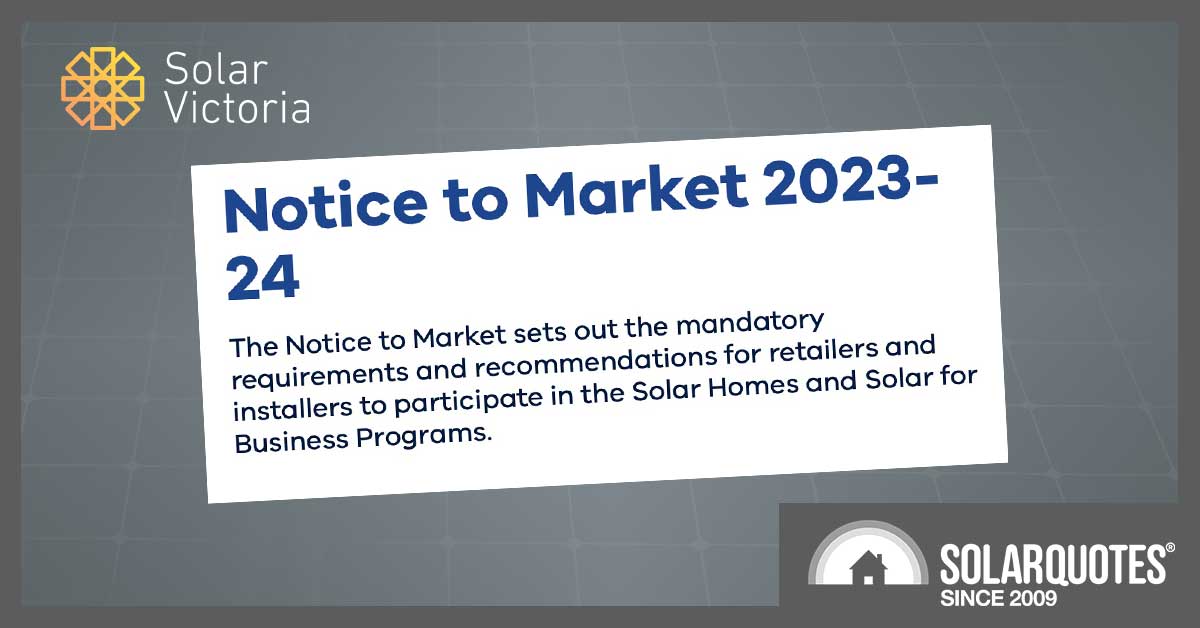
Solar Victoria has published the 2023-2024 Notice To Market, including five new mandatory requirements and rather more recommendations.
The notice lays out the rules retailers have to follow so their customers can take advantage of Victoria’s rebates for solar PV, household battery, and heat pump hot water systems.
The requirements, set out below, come into force on 1 July 2023, aside from a couple of exceptions.
Requirement: Timers for Hot Water Heat Pumps
Solar Victoria wants to maximise self-consumption of solar power, a sensible aim given the problems the local grid suffers during excess production. So, as of 1 March 2024, it’s mandating timers for heat pump hot water systems.
The integrated timer has to let the unit “run between a specified time window, or is connected to a solar PV system and runs during periods of solar generation”.
The system should be able to override the timer if needed, has to support defrost cycles, and has to meet other health requirements for water heaters.
SV notes that since heat pumps work best at warmer temperatures, timers make sense – and they would reduce the risk that heat pumps running in colder ambient temperatures would fail.
Requirement: Retailers Subject to the New Energy Tech Consumer Code
In February, the Clean Energy Council replaced its troubled Approved Solar Retailer Code of Conduct with the New Energy Tech Consumer Code (NETCC).
Solar Victoria has revised the Notice to reflect the change: PV and battery retailers will have to sign with the NETCC, and maintain the status of NET Approved Seller.
Requirement: Take Down The Numbers
PV, battery and hot water retailers are now required to record product serial numbers, along with other product data. As well as helping OEMs in the event of a product recall, Solar Victoria said tracking products will help with end-of-life management.
We’ve seen a number of product recalls in the last few years: the SolarImmersion PV diverter in 2020, the Growatt inverter recall in 2021, and of course the ongoing LG battery recall.
Requirement: Warranties
All retailers will also have to offer a minimum five-year whole-of-system warranty, to improve consumer protection.
Inverters, PV modules, batteries and smart controllers, and heat pump hot water systems will have to be offered with a five-year whole-of-product warranty.
Recommendations
PV vendors should offer a performance warranty – 90% production after 10 years, and 80% after 25 years.
Heat pump hot water retailers have new recommendations covering tank size guides: 150-225 litres for one or two occupants; 225-300 litres for two to four occupants; and over 300 litres if there are four or more occupants.
There’s apparently a concern that heat pump hot water could be installed in locations colder than their specification allows. To deal with that, Solar Victoria recommends that retailers look up climate data at the Bureau of Meteorology, and keep the minimum operating temperature of the heat pump they sell higher than the likely minima at the customer’s location.
Solar Victoria also wants all retailers to recommend customers use the “solar saver” tool on the Victorian Energy Compare website.

 RSS - Posts
RSS - Posts



From my personal experience energy compare websites should be tested by the people insisting we use them. Our Vic gov compare sight is an example of that, try it yourself and see if you can get the info required. When complaints are made you are advised it is just for reference with nobody verifying data and plans to reflect accurate info, some of the questions asked when not supplying info from power company include how far do you live from the sea, I cannot work out what relevance that would have. Thankfully I did find a good deal and haven’t had to use it again, good luck.
Hi Richard,
Thank you for this information. I’d be grateful for a NSW comparison, particularly for warranties.
So no rule changes for non-participants then. More incentives to not connect to the grid and run stand alone segments in a federated topology.
You can still connect to the grid if you don’t participate – you just can’t claim the Victorian rebates or loans.
I wonder about the minimum climate requirement for heat pumps. Living in a fairly cold climate you can make your heat pump installation a lot more effective if you choose the location of the unit carefully. A sheltered spot adjacent to a brick wall on the north side of your home in a sunny spot combined with daylight or timer switching makes a hell of a difference to the units operations. Although the BOM data is ok for general calculations microclimate around your dwelling is more of a determining factor for selecting the right solution. I often wonder why someone hasn’t come up with a heat pump solution that could be mounted in the ceiling space making use of the warm air created by all those dark roofs that are so popular in the suburbs….
I was one of the first people to get a heat pump HWS in Canberra and the installer set it up exactly the way you have said. He also said that is the only way they will work. After DUX retrofitted a chip for cold climate operation it worked well for 5 years and dropped electrical the power consumption by two thirds. Then the pump failed, the tank started to leak and worst of all the sacrificial anodes both dissolved and only a gel came our through the taps. None of the “stakeholders” wanted to help or they denied it was their problem. The importance (and inconvenience/cost) of replacing the sacrificial anodes wasn’t highlighted before purchase and that is really the problem with them. It will be interesting to see if ones now being financed on “interest free” loans that fail are covered by the linked provider clauses of the Credit Act.